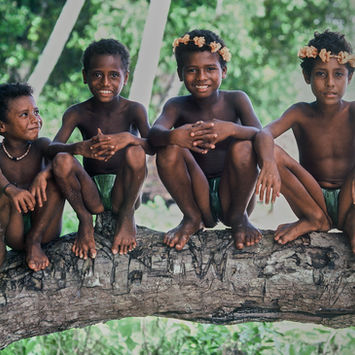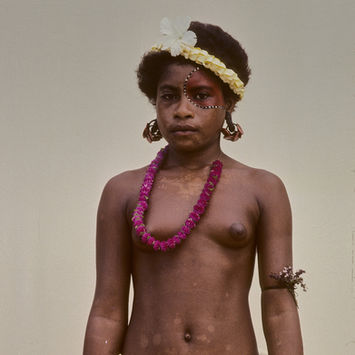MALCOLM KIRK
PHOTOGRAPHS

NEW GUINEA/KIRIWINA
Kiriwina is the largest of a cluster of coral islands, collectively known as the Trobriands, located off the easternmost tip of the island of New Guinea. These islands attracted the attention of the outside world in 1922 following the publication of Argonauts of the Western Pacific, an account of the inhabitants’ extraordinary inter-island canoe voyages for the purpose of gift exchange – a ceremony known as the Kula ring – written by the renowned Polish ethnographer, Bronislaw Malinowski.
A pervasive belief in spirits and magic permeates Trobriand life. Magic is used to ensure success in virtually every activity ranging from gardening, fishing, canoe-building, and dancing to healing, beauty and love. Unlike other areas of New Guinea the people here have a hereditary aristocracy, ranking from a Paramount Chief – respected and feared for his knowledge of sorcery and poisons – down through lesser chiefs to commoners. The society is also matrilineal, so that upon a man’s death his inheritance goes to his sister’s son rather than to his direct offspring.
Trobriand society revolves around exchanges of items that may have little intrinsic practical or monetary value but which bestow prestige on the temporary possessors, create obligations to respond in kind, and cement relationships amongst kin.
Participants in the Kula ring are men of some status who engage with partners of similar rank on neighbouring islands, trading necklaces of red shell (soulava) in a clockwise direction, and armbands of white shell (mwali) in the opposite direction. The continuous circulation of items ensures that none stays in any particular place for very long. Their voyages in ocean-going canoes (masawa) are often lengthy and potentially dangerous.
Grand mortuary rituals known as sagali are presided over by women. Those with matrilineal links to the deceased individual present gifts of grass skirts and currency known as doba (bunches of dried banana leaves) to the widow and other unrelated women in recognition for their contributions during the mourning period.
Yams, grown in the thin soil of the coral gardens, are another form of wealth and power. They are prominently displayed in special yam houses within each village, the horizontal log walls of which are spaced sufficiently far apart to promote air circulation and allow onlookers to admire the size of each yam. Milamala, the harvest celebration, is an occasion for dancing, feasting and sexual liaisons and a time when the baloma, or spirits of the dead, return temporarily to their native villages from Tuma, a small island off the coast where the souls of the departed go to live.
I first came to Kiriwina in 1972, and subsequently returned four more times, on a couple of occasions accompanied by my wife, Bryce. Altogether, I spent five months camped on an isolated beach near a small village on the north coast. Living like a castaway, these were some of the most idyllic moments of my life.
Fresh water seeped from the sand at the high-tide mark only a few paces from our campsite; the girls would collect it in coconut shells and take back to the village. On days when they weren’t working in their taro and yam gardens the men would come down to the beach and launch their outrigger canoes into the lagoon to fish with their nets. Despite our protestations, they would insist on bringing us the tastiest of the catch. On moonlit nights, they dove on the reef for crayfish, which we promptly cooked over an open fire and shared with our hosts.
Sabarana, the shark fisherman, possessed particularly powerful shark magic. Paddling his outrigger out beyond the reef into the deeper ocean water and momentarily disappearing behind the swells, he would vigorously froth the water with a coconut shell rattle. Eventually a shark, attracted by the commotion and vibrations, would circle around before taking the baited hook dangling nearby. A ferocious struggle would ensue as Sabarana, now standing upright in his fragile craft, repeatedly struck it with his club before bringing it back to the beach, to be divided and shared between the villagers.
Each evening, after dinner, the children would arrive and decorate our hair and campsite with garlands of scented flowers, before singing and dancing around an open fire. When we were ready to sleep a discreet yawn signalled everyone to slip away in the dark.
Mwabula and Mwaigibela, the two elderly chiefs of Kapwani, were my adopted fathers. Mwabula - the senior of the two - had a gentle disposition and rarely interfered in village affairs so it was left to Mwaigibela, practitioner of magic and sorcery, to maintain order when circumstances demanded it. Much to my dismay, he permanently expelled a trouble-maker from the community for absconding with a small bar of my soap.
On those nights when moonlight illuminated the narrow path down to the beach, the pair would come and join me on the sand. Sitting on either side of me, our shoulders touching, we would quietly contemplate the scintillating reflections upon the lagoon and listen to the soft lap of waves upon the shore. No words were exchanged and none were necessary, but once our unspoken conversation was over, they would rise together and take their leave.
My announcement that we ourselves must soon depart was met with some consternation.
“Why must you go?” the villagers asked. “We thought you came here to live with us. What more do you need? Don’t we share our fish and bring you taro and other vegetables from our gardens?”
I could come up with no satisfactory answer, but once reconciled to the idea and a departure date had been settled upon, everyone joined to prepare a farewell feast. At sunset formidable platters of food and rolls of pandanus-leaf mats were carried down to the beach and a bonfire was lit upon the sand. Then we all ate and sang and danced around it, then ate and sang and danced some more before tiredness finally overcame us. We expected to be left alone now but instead the mats were unfurled in a circle about the campsite and we passed the remainder of the night in fitful sleep together.
We packed up next morning, and everyone accompanied us back to the village. I asked them to gather around to hear the speech I had prepared. I started by urging them not to envy our Western way of life but then – as I commenced thanking them for all they had done to make our stay such a memorable one – I saw eyes begin to moisten and well into tears.
I swallowed, trying hard to restrain myself, but the emotion building up within me defied control, erupting in a flood of anguished sobs. We remained with our friends for some time longer, hugging tightly to one another, reluctant to let go.
Postscript: My final visit to Kapwani was in 1985, but it was always my intent to return until I learnt, more recently, that the reef further down the coast had been breached and a jetty built to accommodate cruise-ships. Climate change has dramatically reduced the yam and taro harvests and villagers now earn a living by selling souvenirs to tour groups and entertaining them with dances performed out of traditional context. Tourism for its part has brought them HIV. I cannot foresee ever going back.























